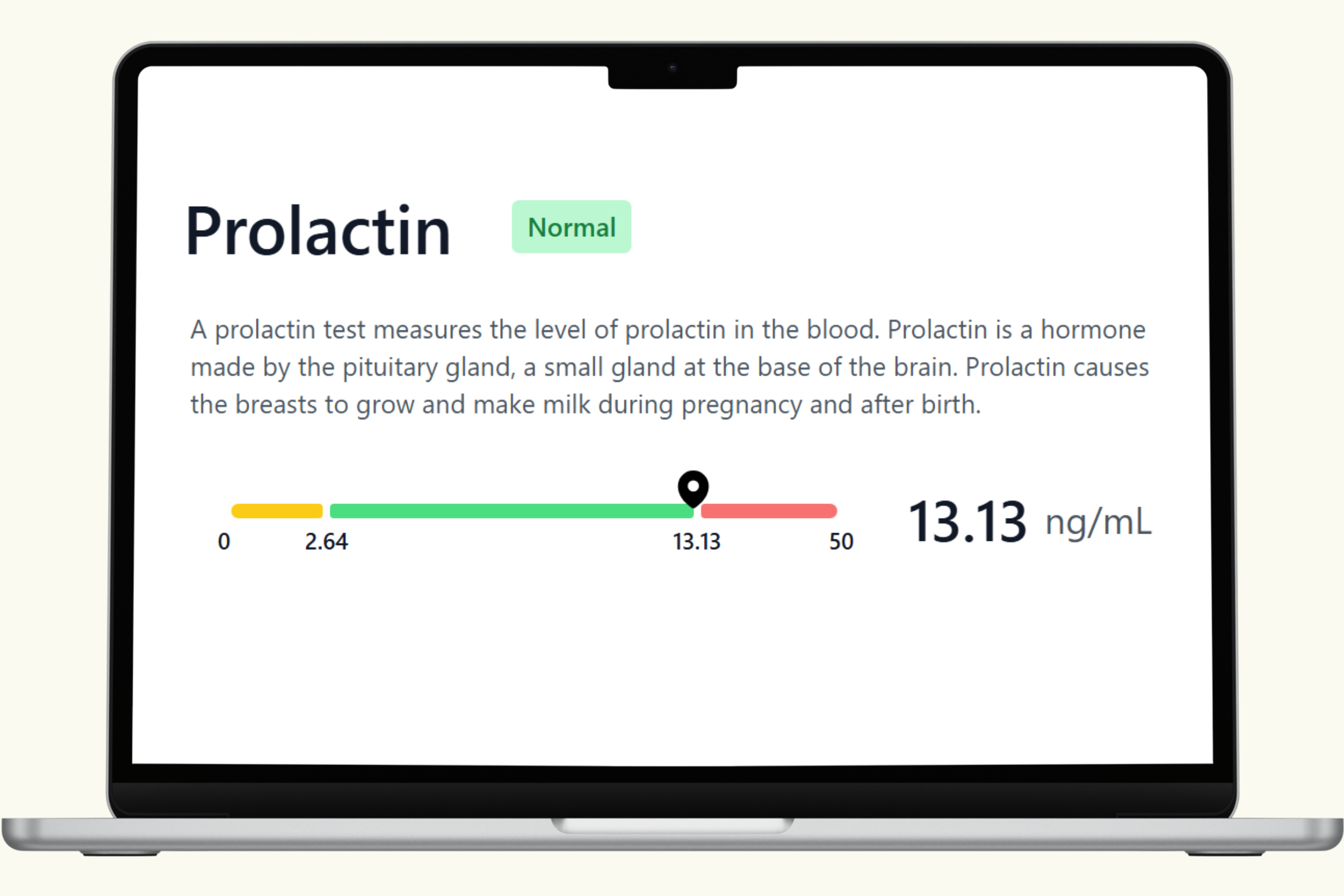Prolactin (PRL) Blood Test: A Key Hormone for Fertility and Hormone Balance
The Prolactin (PRL) Blood Test, included in the PlexusDx Women’s Fertility Blood Test, measures prolactin levels to help evaluate reproductive health, fertility challenges, and pituitary function. Prolactin is a hormone produced by the pituitary gland that primarily stimulates breast development and milk production after childbirth. While this hormone is essential during pregnancy and lactation, abnormal levels outside of these life stages can disrupt hormonal balance, menstrual cycles, and fertility in women—and testosterone production and sperm health in men. Measuring prolactin provides valuable insights for diagnosing hormonal imbalance and guiding fertility care.
What is Prolactin?
Prolactin is best known for its role in preparing the body for breastfeeding. During pregnancy, levels rise to stimulate breast tissue development, and after birth, prolactin supports milk production. However, prolactin also plays a role in reproductive hormone regulation, influencing levels of estrogen, progesterone, and testosterone. Because of this, elevated prolactin (a condition called hyperprolactinemia) can interfere with fertility in both women and men.
Why Test Prolactin?
Doctors may order a prolactin test when evaluating:
- Infertility: High prolactin can suppress ovulation and lower fertility.
- Irregular or missed periods: Elevated prolactin may disrupt menstrual cycles.
- Unexpected milk production (galactorrhea): A sign of excessive prolactin secretion.
- Pituitary disorders: Prolactinomas (pituitary tumors) often elevate prolactin levels.
- Reduced sex drive or low testosterone: In both women and men, prolactin imbalances can contribute to hormonal issues affecting libido and energy.
Reference Ranges for Prolactin
Reference values may vary by laboratory, but general ranges include:
- Non-pregnant women: 4.8 – 23.3 ng/mL
- Pregnant women: 34 – 386 ng/mL
- Men: 4.0 – 15.2 ng/mL
Elevated prolactin (>25 ng/mL in non-pregnant women or men) may signal pituitary gland disorders, hypothyroidism, PCOS, stress, or certain medications. Very high levels (>100 ng/mL) often suggest a pituitary tumor (prolactinoma).
How Prolactin Affects Fertility
Prolactin has a direct influence on reproductive health:
- In women: High prolactin can stop ovulation, cause irregular or absent periods, and reduce estrogen levels—leading to infertility, vaginal dryness, and bone loss over time.
- In men: Elevated prolactin lowers testosterone production, which can cause reduced libido, erectile dysfunction, low sperm count, and infertility.
By interfering with reproductive hormones, prolactin imbalances are an important but often overlooked cause of fertility challenges.
Symptoms of Abnormal Prolactin Levels
Signs of elevated prolactin may include:
- Irregular or absent menstrual cycles
- Unexplained infertility
- Unexpected breast milk production (galactorrhea)
- Headaches or vision changes (if related to a pituitary tumor)
- Low libido, fatigue, or hot flashes (from low estrogen or testosterone)
Specimen Collection with PlexusDx
The Prolactin Blood Test in the PlexusDx Women’s Fertility Panel is performed using an at-home dried blood spot collection with an ADX card. A simple finger prick provides a few drops of blood, which are applied to the collection card and mailed back to the laboratory. This method makes hormone testing accessible, convenient, and accurate—without the need for a clinic visit.
Benefits of Prolactin Testing with PlexusDx
- Convenient at-home collection: Skip the lab and collect your sample from home.
- Part of a complete fertility panel: Prolactin is tested alongside LH, FSH, estradiol, TSH, and other key hormones.
- Actionable results: Detect hidden hormonal imbalances that may be affecting fertility.
- HSA/FSA eligible: Pay with pre-tax healthcare dollars.
- Empowers reproductive planning: Results help guide next steps with your healthcare provider.
Next Steps if Prolactin is Out of Range
If your prolactin levels are higher or lower than expected, your healthcare provider may recommend:
- Repeat testing: Since stress, recent exercise, or even a heavy meal can temporarily affect prolactin, re-testing may be necessary.
- Further evaluation: MRI imaging of the pituitary gland or additional hormone testing.
- Medication: Dopamine agonists (such as bromocriptine or cabergoline) can effectively lower prolactin levels if needed.
- Treating underlying causes: Addressing thyroid disease, PCOS, or medication side effects.
Conclusion
The Prolactin (PRL) Blood Test is a valuable tool in understanding fertility, hormonal balance, and pituitary health. Elevated prolactin can disrupt ovulation, lower sex hormones, and contribute to infertility in both women and men. By including prolactin in the PlexusDx Women’s Fertility Blood Test, women gain a comprehensive view of their hormone profile and the insights needed to take proactive steps in their reproductive journey.

Share:
Anti-Mullerian Hormone (AMH) Blood Test